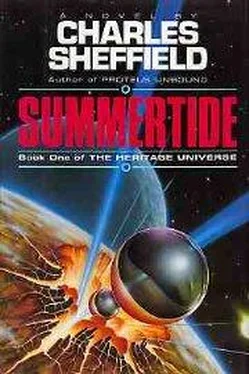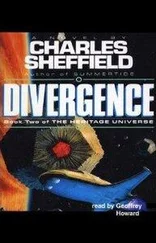Charles Sheffield
Summertide
For Ann, Kit, Rose and Toria.
PROLOG
Expansion
1086 (3170 A.D.)
A ninety-seven-year silence was ending.
For close to a century the ship’s interior had heard no human voice and felt no human footstep. The vessel whispered its way between the stars, passengers close to absolute zero in dreamless paradeath. Once a year their bodies warmed to liquid-nitrogen temperatures while shared experiences were fed to them from the ship’s central data bank: memories of a hundred years of interstellar travel, for bodies that would age less than one day.
As the final weeks of deceleration began it was time to start the awakening. When the destination was reached, decisions might be needed that went beyond machine judgment — a notion that to the ship’s main computer, the first of its kind to be equipped with the Karlan emotional circuits, was both insulting and implausible.
First warming was initiated. Interior sensors picked up the reassuring flutter of returning heartbeats, the initial sigh and murmur of working lungs. The emergency crew would be awakened first, two by two, on a last-in, first-out basis; only with their approval would others begin emergence.
The first pair drifted up to consciousness with one question burning in their minds: Was it arrival — or was it override?
The computer had been programmed to rouse them for only three reasons. They would be disturbed if the ship were closing at last on their destination, Lacoste-32B, a minor G-2 dwarf star that lay three light-years beyond the rose-red stellar beacon of Aldebaran. They would wake if an on-board problem had arisen within the ship’s half-kilometer ellipsoid, a disaster too big for the computer to handle without human interaction.
Or, the final possibility, they would be pulled from hibernation if one of spacefaring humanity’s oldest dreams had become reality:
I/T — Immediate Transfer; Interstellar Transition; Instantaneous Travel; the superluminal transportation system that would end Crawlspace exploration .
For more than a thousand years the exploration and colony ships had crept outward, widening the sphere of Earth’s influence. The millennium had yielded forty colonies, scattered through a Sol-centered globe seventy light-years in diameter. But every inch within that sphere had been traveled at less than a fifth of light-speed. And every colony, no matter how small and isolated, had a research program that sought the superluminal…
The first two wakened were one man and one woman. They fought a century-long lassitude, queried the ship’s internal status panels, and shared their relief. No on-board disaster had occured. The message center held no urgent incoming file, no news of a great breakthrough. There would be no party of superluminal travelers waiting to welcome late-arrival colonists at Lacoste.
Ahead of the ship the target star already showed a visible naked-eye disk. Gravitational perturbations of the star had long predicted the presence of at least two orbiting giant planets. Now their existence could be confirmed by direct observation, together with five smaller bodies closer to the primary.
The woman was recovering faster than the man. It was she who first left the Schindler hibernation unit, stood up shakily in the one-tenth-gee field, and moved to stare at the external displays. She uttered a low sound, a grunt of satisfaction from sluggish vocal cords, followed by an experimental clearing of her throat.
“We made it! There it is.”
And there it was. The molten-gold disk of Lacoste lay at the exact center of the forward screen. Two minutes later the man had eased his way to her side, still wiping protective gel from his face. He touched her arm in congratulations, relief, and love. They were life-partners.
“Time to waken the others.”
“In a few minutes,” she said. “Remember Kapteyn. Make sure we’ve got something.”
The example of Kapteyn’s Star was written in every explorer’s memory: eight planets, all apparently with wonderful potential; and all, on close inspection, useless for human habitation or for supplies. The early colony ship that had arrived at Kapteyn had been too depleted to reach any second target.
“We’re only two light-days out,” she went on. “We can start scanning. Let’s take a look for oxygen atmospheres before we wake anyone else.”
The on-board computer picked up her command and responded to it. One oxygen world, said its soft voice. Life probability 0.92. The field of view zoomed and swung so that Lacoste first grew rapidly in size and then disappeared from the top of the screen, while a new pinpoint of light appeared at the screen center and swelled to fill it.
Fourth planet, the computer said. Overall figure of merit for Earth isomorphism, 0.86. Mean distance, 1.22; mean temperature range, 0.89 to 1.04; axial tilt—
“What the devil is that? ”
The computer paused. The man’s question had no meaning.
The screen held a planet at its center, a blue-gray sphere already seen in enough detail to reveal the broad bands and swirls of atmospheric circulation patterns. But it also showed a web of hazy lines and bright spirals surrounding the planet and cradling it in multiple strands of light.
“Somebody got here ahead of us…” The woman’s voice faded before the sentence was completed. The information network among inhabited planets was in continuous operation. It was limited to light-speed, but even so she could not believe that some exploring ship had also been sent to Lacoste, unknown to them. And if another ship had arrived here, the scale of what they were seeing went beyond anything that an exploring colony might accomplish in a few years.
Or in a few centuries.
“Pan view.”
The computer heard her words and adjusted the image. The planet shrank to pea size, a bright bead of light at the middle of the screen. The surrounding nimbus of intensive in-space construction was revealed, a gleaming nacreous setting within which the planet nestled like a pearl in an oyster. Slender tendrils of construction stretched out endlessly, thinner and thinner, until they fell below the resolution of the observing sensors.
“Not our kind, Tamara,” the man said softly. “That’s not us.”
No human works, not even the ring cities that surrounded Earth itself, came close in size and complexity. Some of the spiraling filaments around the planet had to be over four hundred thousand kilometers long and many kilometers across. They should have been unstable to gravitational forces from the planet, to tidal perturbations, and to their own interactions. And yet clearly they were not.
“Time to wake the others,” Tamara said.
“And then?”
“And then…” She sighed. “And then, I don’t know what. We finally did it, Damon. We found another intelligent species. A technologically advanced one, too. But if they could build that ” — she gestured at the dazzling structure on the screen, and her voice became husky — “why didn’t they find us ? Well, I guess we’ll know the answer to that in a few more days.”
Three weeks later the ship’s pinnaces were roving the veins and arteries of the space artifact. For fifteen days the main vessel had hovered five million kilometers away, waiting for and expecting contact from the planet in response to radio and laser signals. They had been met with total silence. Finally they had approached and begun direct exploration.
The misty filaments on the screen resolved themselves to the interlocking network of a colossal artifact. They stretched down to the surface of the planet, an uninhabited world apparently well suited to human colonization; but the tendrils also reached far out into space, for purposes that could not even be guessed at.
Читать дальше












